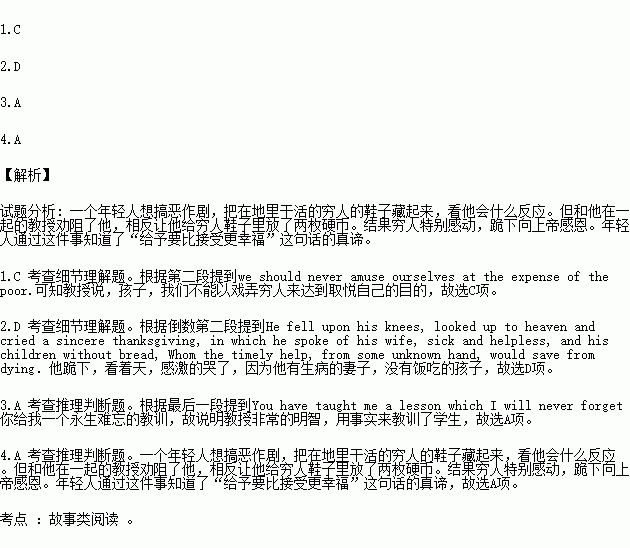题目内容
One day, a college student was taking a walk with a professor. As they went along, they saw
lying in the path a pair of old shoes. They supposed the shoes belonged to a poor man who was employed in a field close by, and who had nearly finished his day’s word.
The student turned to the professor, saying, “ Let us play the man a trick: we will hide his shoes, and hide ourselves behind those bushes, and wait to see his confusion when he cannot find them”.
“My young friend,” answered the professor, “we should never amuse ourselves at the expense of the poor. But you are rich, and may give yourself a much greater pleasure by tricking on the poor man. Put a coin into each shoe, and then we will hide ourselves and watch how the discovery affects him.”
The student did so, and they both placed themselves behind the bushes close by. The poor man soon finished his work, and came across the field to the path where he had left his coat and shoes. After he slipped his foot into one of his shoes, he felt something hard. He bent down to feel what it was, and found the coin. Astonishment and wonder were seen on his face.
He fixed his eyes on the coin, turned it round, and looked at it again and again. He then looked around him on all sides, but no person was to be seen. He now put the money into his pocket, and continued to put on the other shoe; but his surprise was doubled on finding the other coin. His feelings overcame him. He fell upon his knees, looked up to heaven and cried a sincere thanksgiving, in which he spoke of his wife, sick and helpless, and his children without bread, Whom the timely help, from some unknown hand, would save from dying.
The student stood there, deeply affected, and his eyes filled with tears.“Now,”said the professor,“are you not much better pleased than if you had played your intended trick?”
The youth replied,“You have taught me a lesson which I will never forget.
1.The student wanted to play the poor man a trick to _________________.
A.find the truth B.show his wisdom
C.amuse himself D.teach him a lesson
2.After finding the two coins, the man felt_____________.
A.helpless B.interested
C.peaceful D.thankful
3.We can know from the passage that the professor is ___________.
A.wise B.rich C.humorous D.serious
4.What dose the story intend to tell us?
A.A small act of kindness brings great joy.
B.God helps those who help themselves.
C.Where there is a will, there is a way.
D.Actions speak louder than words.

